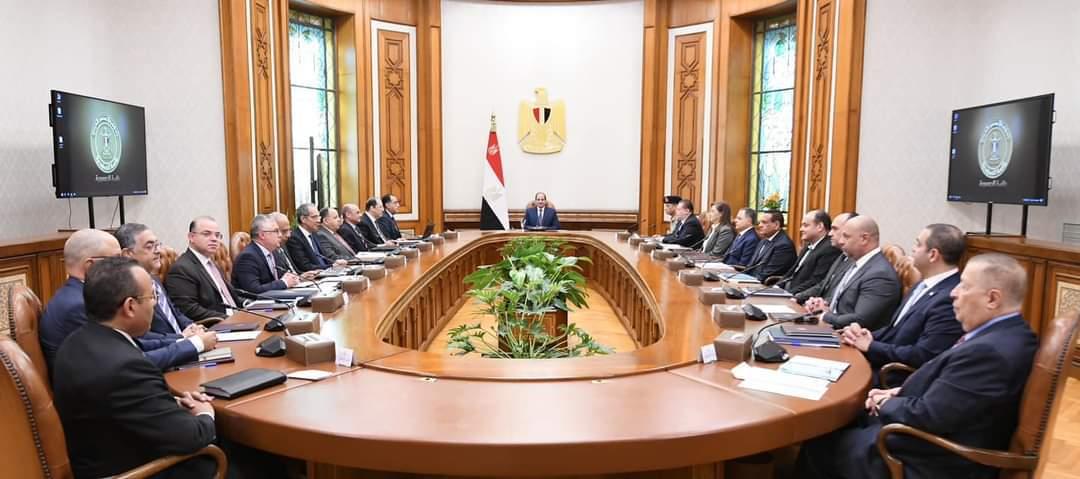(MENAFN- Daily News Egypt) Egypt's Supreme Council for Investments announces a package of incentives and administrative reforms in a bid to boost investments in the country.
This came during the council's first meeting after the reconstitution on Tuesday. The meeting was chaired by President Abdel Fattah Al-Sisi, and attended by Prime Minister Mostafa Madbouly, Central Bank of Egypt Governor Hassan Abdalla, as well as ministers, officials and representatives of the private sector who are members of the Council.
The Supreme Council for Investments approved a decision to set a specific time limit for all approvals of 10 working days, and for one time upon incorporation, which adds more confidence in the investment climate in Egypt.
Also, it directed the General Authority for Investment and Free Zones (GAFI), in cooperation with all concerned authorities, to establish a“unified electronic platform for the establishment, operation and liquidation of projects.
The council also directed GAFI to approve amendments to the electronic signature law and refer it to Parliament, in a way that reduces bureaucratic barriers and simplifies procedures.
A draft decision was approved to study the amendment of some articles of the executive regulations of Egypt's Investment Law to allow licensing of industrial projects based on natural gas as one of the production inputs, to operate under the free zones system.
The Ministry of Justice has been tasked with preparing a set of legislative amendments necessary to overcome restrictions related to land ownership and to facilitate foreign ownership of real estate.
Moreover, the council agreed to expand the issuance of the golden license and not limit it to companies working on strategic or national projects. They also agreed to amend the articles regulating the golden license to ensure that companies established before the investment law of 2017 may be granted the golden license.
The decisions also included assigning the Cabinet to study transferring the affiliation of the utility sector's regulatory bodies, in a way that guarantees their independence.
This aims to enhance the separation between ownership and management in a number of state sectors.
Furthermore, the council issued a decision to amend some legal articles that grant preferential treatment to state-owned companies and entities, to level the playing field in the Egyptian market.
A draft decision was approved to issue a law establishing a unit in the Cabinet that collects data on state-owned companies, and its decisions are binding on restructuring, whether by selling or transferring affiliation from one party to another.
To address the difficulty of importing production requirements, a draft decision was approved to amend Law No. 7 of 2017; to allow the foreign investor to be registered in the importers register, for a period of 10 years.
A draft decision has been approved to ensure that no party may issue general regulatory decisions that add financial or procedural burdens related to the establishment or operation of projects that are subject to the provisions of the Investment Law.
The decision also forbids any entity to impose fees or charges for services on them, or amend them, except after taking the opinion of the GAFI's Board of Directors, the approval of Cabinet, and the Supreme Council of Investments.
A draft decision was also approved directing the Ministry of Finance to create a clearing system between investors' dues and their tax or other burdens for the benefit of government agencies, with a time limit (45 days) that guarantees the speedy refund of value-added tax and speeding up procedures.
Within the framework of efforts to create a stable tax legislative environment, a draft decision was approved to accelerate the release of Egypt's tax policy document for the next five years.
This decision aims to ensure clarity and eliminate the instability of tax legislation, the multiplicity of agencies entrusted with it, and the imposition of additional fees from various agencies.
The decisions also included a draft decision to assign the Ministry of Justice to finalize the amendments to the profit transfer law for holding companies and subsidiaries, in a way that ensures the reduction of tax burdens and the avoidance of double taxation.
It also included the adoption of a package of incentives in support of a number of sectors and projects, with regard to export and customs fee and standardised pricing strategy.
This includes agricultural, industrial, and energy sectors with regard to green hydrogen production, in addition to the housing sector, real estate developers and investment projects in new cities, as well as the transportation sector.




















Comments
No comment